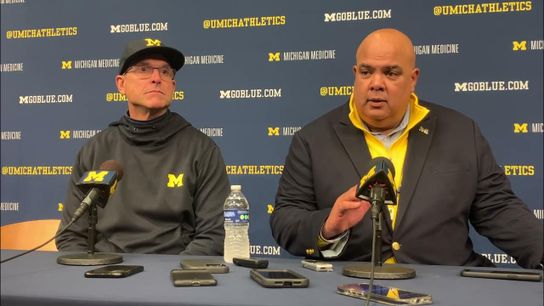Jim Harbaugh, Michigan man. Michigan man of distinction.
He's now the recipient of the NCAA's biggest ban-hammer against a collegiate football coach.
As it wrapped up the public disclosure portion of its 22-month investigation into Harbaugh's Wolverines football program and the accompanying sign-stealing scheme allegedly originated by disgraced former low-level Michigan staffer Connor Stalions, the NCAA on Friday also revealed additional punishment for both individuals, as well as the school's football program.
And Harbaugh, already under the auspices of a four-year NCAA-issued show-cause penalty, just saw that banishment extended. By a decade.
Harbaugh was handed a 10-year show-cause punishment in Friday's NCAA Committee on Infractions judgment. That decade-long banishment does not start until the end of his present show-cause term, which already spanned from August 2024-August 2028.
So, thinking much about the far-off time of the year 2040 these days? It's just about the next time Harbaugh would be welcomed to serve as an employee of an NCAA member school.
Consider: the United States, which celebrates its 250th birthday next year, will be closer to 300 years old than 200 years old the next time Harbaugh will emerge from his personal NCAA sanctions.
"One of the problems here was that Coach Harbaugh never turned over any emails or text messages and then refused to be interviewed by NCAA enforcement staff, so the record is incomplete," said NCAA COI public member Norman Bay. "Mr Stalions said he destroyed his iPhone and threw it in a pond.
"We may never know the extent others in the program were aware of what Mr. Stalions was doing."
Perhaps most damning? The NCAA COI discovered that Harbaugh or one his staff members called the University of Michigan's own NCAA Compliance office "scum" and the "enemy."
“The true scope and scale of the scheme, including the competitive advantage it afforded, will never be fully known due to individuals’ intentional destruction and withholding of materials and information," Bay said on Friday's Zoom. "But the intent was clear — to gain a substantial competitive advantage,You don’t put together a network of individuals called the ‘KGB’ that records what they call ‘dirty film’ where the cost of doing this is in the tens of thousands of dollars over three seasons unless you intend to gain a substantial competitive advantage.”
Three seasons. Let's ponder this, then, about Harbaugh's timeline at Michigan:
Harbaugh was 21-11 in three seasons before the timeframe that the NCAA established that covered the Stalions-led scheme, including a woeful 2-4 mark in the COVID-shortened 2020 season when many people still strongly believe Michigan simply folded at the end of its season rather than take what could have been a ninth-straight loss to hated rival Ohio State.
Channeling Taylor Swift here, in the Stalions Era, which the NCAA emphatically said spanned the 2021, 22 and 23 seasons:
Harbaugh never won fewer than a dozen games and posted a combined 40-3 mark in that span that included the 2023 College Football Playoff Championship -- though Harbaugh was suspended for six -- 40 percent -- of his team's games that season.
Would the NCAA have perhaps hammered Harbaugh and/or Michigan even more severely if Harbaugh had not fled to the NFL (and taken many coconspirators with him) immediately following that title run?
Would the penalties have differed if Harbaugh still coached the Wolverines?
"I would simply add that it’s unknowable and I’m not sure there’s a connection between Harbaugh’s employment status and a postseason ban triggered by ineligible competition," NCAA COI chairperson Kay Norton said. "If he had remained employed at Michigan, there would probably be many additional or more complex (layers) to (Harbaugh's complete) lack of cooperation."
So, with Harbaugh one year into 14 years of NCAA Show-Cause penalties, let's examine where that stacks up among the all-time most severe punishments:
-- Former Alabama baseball coach Brad Bohannon, whose NCAA punishment stems from Bohannon's own gambling misdeeds. He's not welcomed back into NCAA waters until 2039.
-- Jerome Allen is on (dubious) record with the longest-tenured NCAA Show-Cause penalty of 15 years for his time as Penn's basketball coach, a mark that runs through 2025
-- ex-Tennessee head basketball coach Donnie Tyndall received a 10-year penalty for infractions the NCAA said it discovered under Tyndall at both Tennessee and Southern Miss
-- ex-Tennessee head football coach Jeremy Pruitt presently is in the midst of an six-year Show-Cause penalty from Pruitt's cheating in recruiting during his time on Rocky Top. He's under penalty into 2029.
-- Harbaugh, with concurrent sentences befitting his repeat offender status, is not scheduled to come out from under his NCAA Show-Cause banishment until August 2038.
"I think the efforts to obstruct and the failure to cooperate aggravate what happened here," Bay said. "In other words, it made what would have been a serious violation even more serious. I think the clear takeaway here for any university, if something like this comes to light, you’ll want to make sure the involved individuals cooperate or fully cooperate.
"The violation was serious to begin with, but the cover-up made it even worse."
